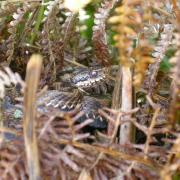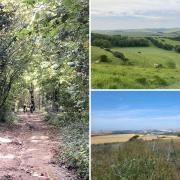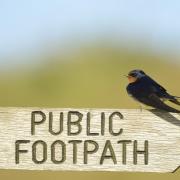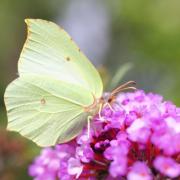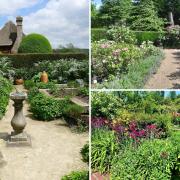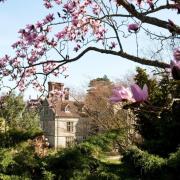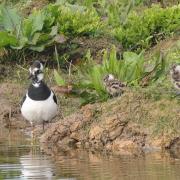Why a visit to WWT’s Arundel Wetland Centre could be just what the doctor ordered for boosting your mood this winter
Surrounded by the rolling hills of the South Downs, with reedbeds framing tranquil lakes and the melodic sound of birdsong in the air, there’s no denying that Arundel Wetland Centre is a beautiful and relaxing spot to visit.
Nestled at the foot of West Sussex’s chalk-based Offham Hangar in the Arun Valley, the popular site - run by conservationist charity, the Wildfowl & Wetlands Trust (WWT) - spans over 60 acres of biodiverse countryside and is dedicated to preserving natural ecosystems and creating spaces for wildlife to thrive.
New research suggests that a visit to the wetlands may hold greater benefits than just an enjoyable day out for nature lovers, though. According to a recent study by WWT, it could also be the ideal spot to banish the January blues, and give us all an opportunity to care for our personal wellbeing this New Year.
The study found that spending time in a wetland environment can contribute significantly to the treatment of anxiety and depression.
Showing a clear link between our relationship with nature and mental health, the research demonstrated that time in nature (especially around water) led to an enhanced mood, and a reduction in stress and negative thoughts.

Similarly, another study from the Mental Health Foundation discovered that 45 per cent of people felt that visiting green spaces such as parks helped them cope during the pandemic, while a 2019 report from Scientific Reports found that being in natural environments for just two hours per week was enough to boost health and wellbeing.
Harnessing this expanding body of evidence, Arundel Wetland Centre is encouraging visitors of all ages to experience a deeper connection with nature, and use the site as a safe and accessible escape from life’s daily stresses.
Created in partnership with the Mental Health Foundation, the initiative sees the centre incorporate meaningful ways for visitors to immerse themselves in the beauty of the wetlands, and practise mindfulness in their blue and green spaces.
Elizabeth Pearce, Learning Manager at WWT Arundel, explains more: 'Research has found that feeling connected to nature brings health and wellbeing benefits, and we aim to provide these opportunities through our events and activities. There are five pathways to nature connection - senses, emotion, beauty, meaning and compassion - and we consider these when planning and delivering our events.'
This holistic approach ties into the growing healthcare practice of ‘social prescribing’ being used as part of the NHS’s Universal Personalised Care; a concept that champions the importance of positive lifestyle choices to help patients improve their health and wellbeing.
WWT centres in Somerset and London are even running ‘Blue Prescribing’ courses - an innovative, nature-based, referral programme which is delivered over several weeks to improve participants’ mental health. While fresh air and long walks have long been considered beneficial to our physical health, ‘nature connectedness’ (a term defined by studies from the University of Derby) and ‘blue prescribing’ is all about exploring and experiencing nature by using all of our senses and taking time to appreciate it on a deeper level.
'A perfect example is our guided boat rides that take you on a trip through our wetlands', says Elizabeth. 'Away from the hustle and bustle, you become tuned in to all the lovely natural sounds: the birds singing, the wind in the reeds, the sound of the water lapping up on the boat. It’s a much slower pace as you glide along the narrow channels, often only a foot or so away from the wildlife that surrounds you. You can’t help but feel connected to nature and a part of it. The peace and tranquillity of it all is really something.'

These boat safaris are just one of the ways that visitors are encouraged to take a moment of peaceful reflection at WWT Arundel. Prompts and boards around the site remind visitors to engage all of their senses to immerse themselves in their surroundings, whilst secluded spots allow space for moments of calm.
Senior Reserve Warden, Emma Jacobs explains how visitors can feel part of nature rather than just using it as a backdrop: 'We have created quiet areas for visitors to linger in, like our small willow arbour, or the benches along the reedbed boardwalks where visitors can close their eyes and listen to the birds and the reeds in the wind. Our Moth Morning and Pond Dipping activities also allow visitors to have nature in their hands and marvel at small creatures, while our Bat Walks encourage visitors to see the site in a different setting and a whole new way.'
One space that allows visitors to fully engage their senses is the Wetland Secrets plant house, opened by English botanist and wildlife campaigner David Bellamy in 1985. Tucked away next to the Reedbed Hide, this beautifully thatched hut is filled with an array of dried herbs and plants, historically used for medicinal purposes. From the healing properties of yarrow through to the stimulating scents of rosemary, the strong fragrances and rich textures of the plants are evocative from the moment visitors enter.
Appreciating the beauty of nature in this way fosters a deeper sense of care and compassion towards the world around us. At a time when climate change is on most of our minds, the team at Arundel Wetland Centre strongly believe in the importance of developing this relationship with nature to improve our emotional connectedness.
'People always remember their first encounter with nature', says Emma. 'If they develop an interest in an animal or place, they are likely to become invested in its care.'
Consisting of even pathways and sturdy, non-slip boardwalks, the site prides itself on its accessibility and inclusive, family-friendly approach. Their ‘Generation Wild’ events and activities throughout the year offer an engaging, fun and educational introduction to nature to spark children's sense of wonder in the world around them.
'It’s incredibly important to introduce children to nature and conservation, through hands-on experiences,' says Elizabeth. 'We aim to demonstrate just how fascinating, amazingly important and interconnected nature is. It connects children with the world around them so that they feel part of it. This encourages respect, appreciation and compassion, which can only be a good thing for their own wellbeing but also for the welfare of the planet.'
In keeping with WWT’s motto of ‘Saving Wetlands For Wildlife And People’, it is clear that these beautiful, natural spaces can provide an essential oasis of solace and calm for humans, just as they do for the thousands of wild species and plants they protect. Whether you’re visiting to develop your photography skills by capturing stunning snaps of the kingfishers, planning a day out for the family, or just seeking some peace and tranquillity, Arundel Wetland Centre is certainly a wonderful place to escape and practise self-care this winter.
Arundel Wetland Centre is open every day between 10am-4.30pm
READ MORE: Sussex South Downs walk: Slindon Estate near Arundel




